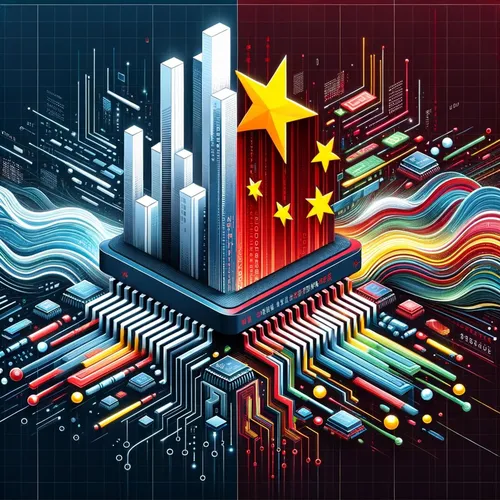Silicon Smackdown: US-China Tech War Heats Up with Chip Deals, Hacks, and Lawsuits Galore!
- Author
- Quiet. Please
- Published
- Wed 20 Aug 2025
- Episode Link
- https://www.spreaker.com/episode/silicon-smackdown-us-china-tech-war-heats-up-with-chip-deals-hacks-and-lawsuits-galore--67458582
This is your Beijing Bytes: US-China Tech War Updates podcast.
Hey listeners, Ting here—your favorite byte-sized guide to all things China, cyber, and the jaw-dropping drama of the US-China tech war. Grab your popcorn, because the past two weeks have been like Silicon Valley colliding with old-school global intrigue.
Let’s plug in fast: This August, we saw AMD and NVIDIA ink a wild revenue-sharing deal with the US government, where they hand over 15% of every dollar from selling approved AI chips into China. No, that’s not a typo—the US gets a cut, like the world’s most awkward business partner at the middle of a tariff tornado. Reuters says this “pay-to-play” move is the price of admission, as chipmakers run the gauntlet of sky-high tariffs and constantly shifting export restrictions.
Hold up, there’s more: The Trump administration, clearly not satisfied with just skimming sales, mulled taking an equity stake in Intel after a tense chinwag between President Trump and Intel’s CEO, Lip-Bu Tan. Intel’s been navigating headwinds on tech process, market share, and now political chess, but SoftBank swooped in with a $2 billion boost, showing that industry support is still strong. If government influence ramps up, expect more chips rolling out of American fabs and fewer crossing the Pacific.
On the Chinese side, the pot keeps boiling. China rolled out more export restrictions, now targeting critical minerals and machine tools. If you were counting on gallium, germanium, or antimony for your next-gen devices, Beijing says—find a new supplier. This disrupts everything from defense supply chains to battery makers. The Chinese Communist Party’s “China Inc.” strategy is laser-focused on keeping the world dependent, while Beijing accelerates domestic chip production, AI labs, and digital infrastructure. China’s E-Town Semiconductor even slapped Applied Materials with a lawsuit over alleged tech infringement, sparking a legal arms race.
Meanwhile on cybersecurity—don’t blink. Microsoft got caught letting China-based engineers “digitally escort” sensitive systems for the US Defense Department. The Pentagon is not amused, and Microsoft has promised to stop, but experts like John Sherman are scrambling to close loopholes before the next hack makes headlines. Ransomware gangs like Qilin have been busy, with attacks on US biotech firm Inotiv locking up 176 GB of juicy data, and researchers tracing links back to China and Russia. The Director of National Intelligence reminds us—as if we needed reminding—China is America’s “most persistent cyber threat.”
Industry impact? Xiaomi’s revenue jumped 30% on booming smartphone sales—especially in Southeast Asia and Europe—while Google’s Pixel 10 launch tries to grab back some hardware glory before Apple’s next iPhone. The consumer scene is jostling as trade war shockwaves ricochet through supply chains, pushing US companies to localize and Chinese giants to dig deeper in self-reliance.
Expert forecasts say the US must balance security and competitiveness with smarter controls, not blanket bans. Stanford’s Srabanti Chowdhury warns: restrict too much, and the US loses revenue and R&D momentum; allow too much, and China just uses the breathing space to ramp up tech independence. One thing is clear: Both sides see tech dominance as national destiny, and neither is blinking.
Thanks for tuning in to Beijing Bytes, your backdoor into the US-China tech war. Hit subscribe and stay wired for more frontier updates. This has been a quiet please production, for more check out quiet please dot ai.
For more http://www.quietplease.ai
Get the best deals https://amzn.to/3ODvOta
